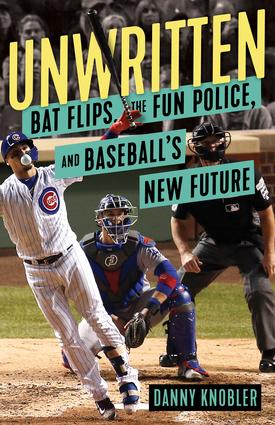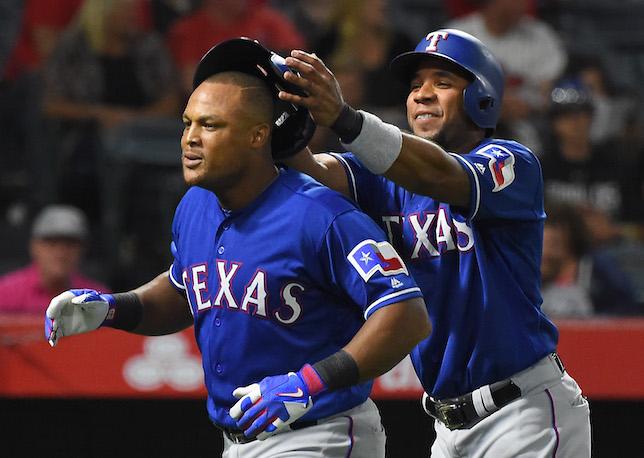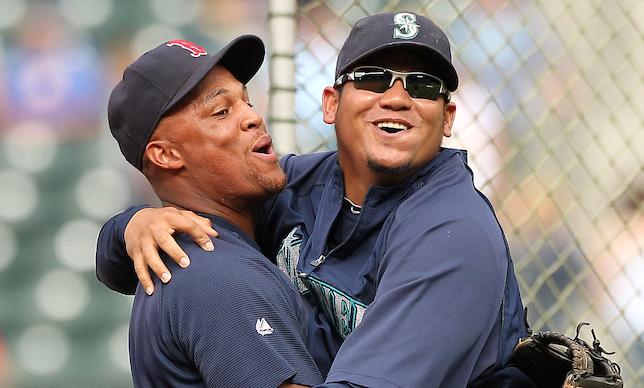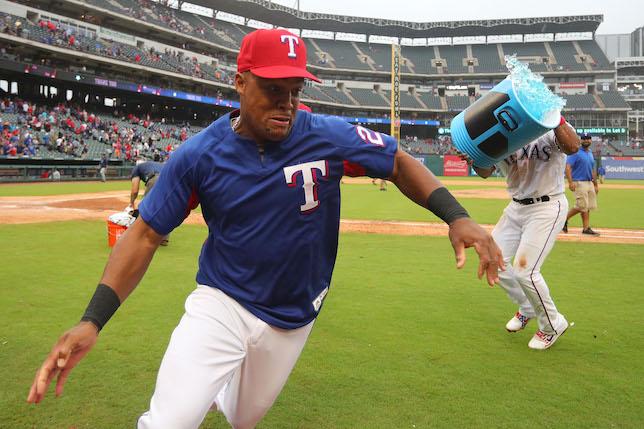Don't bunt in a blowout. Don't pimp your home runs. Act like you've been here before. In Unwritten: Bat Flips, the Fun Police, and Baseball's New Future, author Danny Knobler dives deep beyond the brushbacks and brawls to examine shifting attitudes toward Major League Baseball's once-sacred player codes.
So many of the unwritten rules cover things you can't do as a major-league player, or things that might get you in trouble with your teammates or your opponents. But the game is still supposed to be fun, and guys who make it fun can still find themselves on the way to Cooperstown.
Adrian Beltre proves that, although if you watch a tape of his first major-league hit, you'd never know it. Beltre was a 19-year-old kid back then, in 1998, and he smacked a Chuck Finley pitch into left field for a run-scoring double that night at Dodger Stadium. On the tape, you hear Vin Scully talking about the great numbers Beltre put together at Double-A San Antonio (.321, 13 home runs, in 64 games), about how Beltre was "a very aggressive hitter," and how "it didn't take long for him to collect his first base hit and RBI."
 One other thing about that tape: as the camera shows Beltre standing at second base, the kid doesn't even crack a smile.
One other thing about that tape: as the camera shows Beltre standing at second base, the kid doesn't even crack a smile.
Smiling wasn't against baseball's rules, even then. Not the written rules, obviously, but not even the unwritten ones. But young players were still being schooled to avoid showing too much emotion. It's a long season. Don't get too high or too low. Never forget the game will humble you.
It still will, but thankfully it's now more than okay to show you're enjoying it when things are going well. And even sometimes when they're not. It took Beltre the better part of four seasons to feel comfortable showing emotion and being himself on the field, but he and the game have adjusted over a playing career that ended with his retirement announcement after the 2018 season.
"I don't think he's ever had a bad day at the ballpark," said Doug Brocail, a former major-league pitcher who was on the Texas Rangers' coaching staff in the latter years of Beltre's career. "He's ultra-fun. It's playful and fun, and it keeps guys from insanity."
Beltre provides proof that players today can win respect for "playing the game the right way" while also having fun doing it. As he neared the end of his career, it's possible no one was more respected, and also possible that no one had more fun.
Beltre almost danced in the batters box, asked umpires to check for help when he was sure he had checked his swing, and sometimes ran into the outfield or far onto the infield grass when he was caught in a rundown he knew he couldn't get out of. With the Rangers, he also collaborated with shortstop Elvis Andrus on a pantomime routine where both would set up at the same time to catch a pop fly.
"It's like the Harlem Globetrotters of baseball," said Dave Raymond, who chronicled it all as the Texas Rangers' television voice. "Half the time, I want our [producers] to roll out with 'Sweet Georgia Brown' going into the break. Adrian is Meadowlark Lemon, and Elvis is Curly Neal."

It was the Harlem Globetrotters and it wasn't, because as Beltre said, the Globetrotters' entire goal was to put on a show. He and Andrus were invested in winning games, but they were proving that you could do that and have fun at the same time.
"We have fun, and that's when we do the best," Andrus said. "We really have a passion for the game, and that's what attracted me to baseball in the first place: to be able to do something for hours and hours and still have fun with it. That's what I love about this game."
The key is to know how not to cross the line between enjoying yourself and becoming a clown, and it's possible no one has ever understood that line better than Beltre. A perfect example came in August 2018, in a game where Beltre and the Rangers faced the Seattle Mariners and Felix Hernandez, Beltre's former teammate and close friend.
In the second inning that night in Arlington, Texas, Hernandez struck out Beltre, who took an awkward swing for the third strike. Hernandez laughed as Beltre went to the dugout, and Beltre laughed right along with him.
Four innings later, Beltre hit Hernandez's first pitch for a home run to center field. But there were no laughs or other shows of emotion. Beltre put his head down and quietly circled the bases.

The reason was simple: Beltre's home run made the score 11–4 in the Rangers' favor. Hernandez had given up all 11 of those runs, in one of the worst starts of his career. Hernandez certainly would have understood if Beltre had celebrated -- "Why didn't you do anything?" he texted Beltre after the game -- but Beltre understood a celebration at that point could easily be taken the wrong way.
"Next time, if it's close, I will [do something]," Beltre said.
After 21 years in the major leagues, Beltre understood when a laugh could be helpful and also when it could be seen as showing someone up. The line can be a fine one at times, which is why Rangers general manager Jon Daniels jokingly says Beltre can be both the best and worst example for his younger players. While he's happy to have them joking around at the right time, they need to learn the line that Beltre never seems to cross.
"I always draw a line," Beltre said.
Andrus, in particular, had to learn. He eventually became the perfect foil for Beltre, not just when the two were going through their pop fly routine, but also when Andrus was going after Beltre during a celebration, trying to touch his head. Of all Beltre's quirks, one of the best known is that he never wants anyone touching his head.

"We're two grown men with a kid's soul," Andrus said.
He smiled when he said it. Beltre smiled plenty in the latter years of his career, although he sometimes first made a point of pretending to be angry with Andrus over something he claimed to find annoying. It was all part of what they did, enjoyable for them and entertaining for others.
It looked real, to the point friends asked Andrus why Beltre was mad at him and bloggers sometimes wrote that there was true anger. There wasn't.
"[Beltre] is never actually really mad at anyone," Rangers outfielder Joey Gallo said. "He's fake-mad a lot."
And nothing he did broke any of baseball's unwritten rules. That may not have been true two decades ago, back when Beltre broke into the game, but it's certainly true now.
Do it the right way, and it's absolutely alright to have fun playing the game.
-- Excerpted by permission from Unwritten: Bat Flips, the Fun Police, and Baseball's New Future by Danny Knobler. Copyright (c) 2019. Published by Triumph Books. All rights reserved. No part of this excerpt may be reproduced or reprinted without permission in writing from the publisher. Available for purchase from the publisher, Amazon, Barnes & Noble and iTunes. Follow Danny Knobler on Twitter @DannyKnobler.





